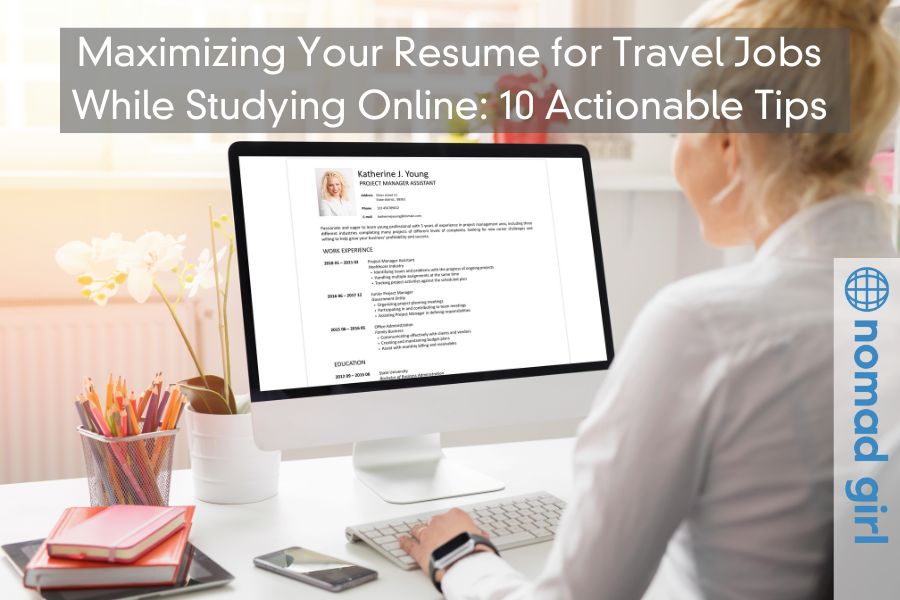In an age where remote education and global travel blend seamlessly, pursuing a travel-related career while studying online offers an intriguing prospect. Yet, as appealing as it may seem, there’s no denying that the competition for travel jobs is fierce. Balancing online coursework with developing the right skills for the travel industry requires more than just a few tweaks on a resume.
It’s about strategically presenting yourself as adaptable, proactive, and ready to take on the world—both figuratively and literally. Here are ten actionable tips to ensure your resume for travel jobs cuts it while you hit the books online.
1. Flaunt Your Remote Learning Skills
While sitting behind a computer screen doesn’t seem like the most exotic setting, your experience in online learning is a valuable asset. Many travel-related roles, from travel writing to digital nomad positions, demand a high level of independence, adaptability, and digital savviness. You’ve already honed these abilities in your online studies.
Time management, self-discipline, and tech proficiency are not just ‘soft skills’—they’re essential tools that keep travel-based careers afloat. Make it crystal clear on your resume that you’re no stranger to virtual collaboration and flexible working environments, proving that you can work under pressure no matter where in the world you are.
2. Highlight Global Awareness
You don’t need a passport full of stamps to demonstrate your cultural acumen. Even if recent travel hasn’t been possible, any form of international exposure can be leveraged. Whether it’s an online course on world history, a virtual internship with an international company, or interacting with peers from different parts of the globe, your adaptability in understanding various cultures should be front and centre on your resume.
Travel jobs thrive on cultural understanding and the ability to navigate different environments with ease, so flaunt your global perspective as if it’s a badge of honor.
3. Spotlight Relevant Certifications
When it comes to standing out in the travel industry, certifications can often be the game-changer. Whether you’ve earned a hospitality management certification, completed a language proficiency course, or acquired project management credentials, don’t let these achievements be wallflowers on your resume.
For instance, a first-aid or CPR certification might seem generic, but in the unpredictable world of travel, such qualifications could be your ticket to success. It’s about painting yourself as a well-rounded candidate who’s prepared for anything the world throws your way.
4. Don’t Let Resume Mistakes Sabotage Your Application
You may have all the right skills, but a poorly constructed resume can sink your chances faster than you can say “next trip.” Avoid the pitfalls of generic descriptions and irrelevant job experiences that clutter up your CV. Be precise and intentional with the skills you list—each point should scream, “I am the right person for this travel job.”
It’s not enough to say you’re organized; prove it by outlining your experience coordinating events or managing itineraries. A resume filled with typos, improper formatting, and meaningless jargon? You might as well hand it over to the shredder.
5. Tailor Your Resume to Fit Like a Glove
No one-size-fits-all approach applies in the travel industry. When crafting your resume, it’s critical to customize it for each specific job. Are you eyeing a tour guide position? Then your leadership and public speaking experience should take center stage. Applying for a content creator role? Let your flair for storytelling and love for discovering new destinations be the stars. Tailoring your resume isn’t just an afterthought; it’s the secret sauce that turns a standard CV into a compelling argument for why you’re the ideal candidate.
6. Showcase Your Online Portfolio
In today’s digital world, having an online portfolio is more than just a bonus—it’s an expectation. Whether you run a travel blog, manage an Instagram account focused on exotic destinations, or have published travel photography, your digital footprint speaks volumes about your commitment to the industry.
It’s your proof of passion, and there’s no better way to prove to a potential employer that you’re serious about travel than by showcasing your work in action. Think of it as an open window into your world—one that hiring managers can peer through to see your creativity and dedication firsthand.
7. Leverage Your Language Skills
In the travel industry, being multilingual is as valuable as gold. Whether you’re fluent in multiple languages or have basic conversational skills in a second language, it’s worth listing this on your resume. Even a modest grasp of another language indicates that you’re culturally aware and ready to engage with diverse groups. The travel world is a global stage, and language skills are your golden ticket to making connections that transcend borders.
8. Prioritize Volunteer and Internship Experiences
Just because you don’t have formal work experience in the travel industry doesn’t mean your resume should be sparse. Volunteering for events, joining travel-related student groups, or completing internships in tourism or hospitality are invaluable opportunities to gain real-world experience. These roles show that you’re willing to get your hands dirty and work your way up.
And more importantly, they highlight your dedication to making a mark in the travel industry. Don’t let a lack of official titles hold you back—after all, every experience is a stepping stone toward your dream career.
9. Use Bold, Action-Oriented Language
Words are your weapons, and on a resume, they need to pack a punch. Vague, weak phrases like “helped with” or “participated in” don’t make a lasting impression. Instead, opt for strong, action-oriented verbs that demonstrate your impact. You didn’t “help organize trips”—you “coordinated and executed multi-stop travel itineraries.” You didn’t “participate in a project”—you “led a team to complete a high-stakes travel logistics project.” These bolder terms make your accomplishments leap off the page and paint a vivid picture of the skills you bring to the table.
10. Keep It Professional Without Losing Personality
While travel jobs may seem more laid-back than traditional office positions, maintaining professionalism in your resume is still paramount. Stick with a clean, readable format, and avoid going overboard with design elements that could distract from the content. However, don’t confuse professionalism with dullness—injecting some personality, especially in sections like your objective statement, can give employers a glimpse of who you are as a person. The key is to strike a balance between professional polish and the passion that fuels your wanderlust.
Conclusion: Make Your Resume a Voyage Worth Taking
Crafting the perfect resume for travel jobs while studying online is a balancing act, but when done right, it’s as rewarding as watching the sunset over a foreign skyline. Think of your resume as the map to your future career, where each section—whether it’s your skills, certifications, or experiences—guides hiring managers toward the inevitable conclusion that you’re the perfect fit.
With these ten tips, you’ll present yourself as a proactive, adaptable candidate who’s not only mastering online learning but also ready to conquer the travel industry. Keep your eyes on the horizon, and let your resume be the ticket that takes you there.


















